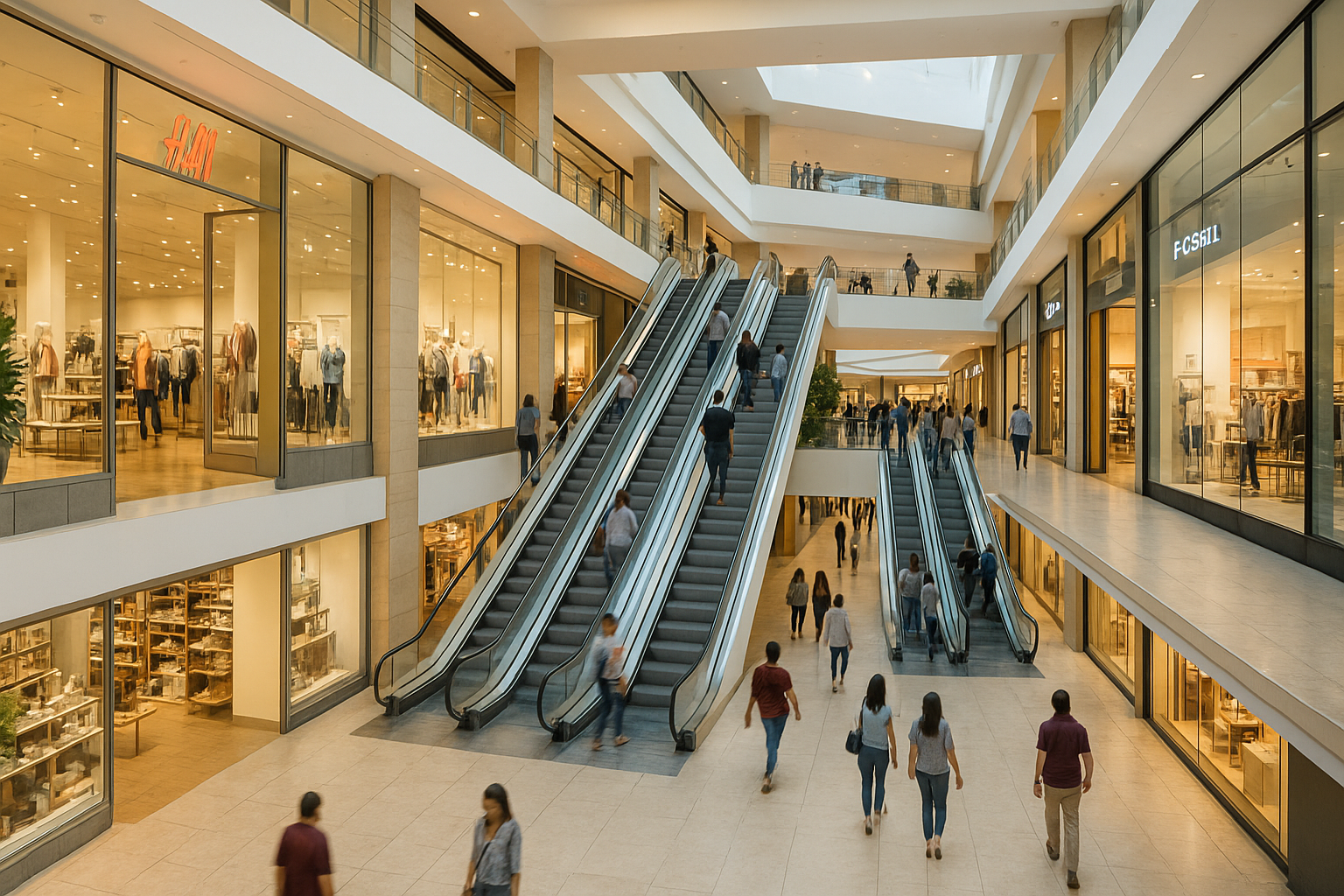The Limitations of Traditional Footfall Systems
For years, footfall counters have been the standard tool for measuring mall performance. But while these systems show how many visitors enter, they reveal nothing about:
- Which zones attract the most engagement
- How long shoppers dwell in specific areas
- How shoppers move between tenants
- Which areas convert traffic into sales
Moreover, accuracy issues are common — traditional sensors can produce errors exceeding 20% due to crowding, shadows, or fast-moving visitors.
This limited visibility weakens decision-making in leasing, merchandising analytics, and mall operations. By upgrading from simple foot traffic counting to retail footfall analytics powered by AI, mall operators shift from assumption-driven management to a behavior-first approach, using data that reflects real shopper actions.
Seeing the Mall Through Smart Spatial Intelligence
AI transforms existing CCTV infrastructure into a powerful source of spatial intelligence. Leveraging computer vision, video analytics retail, and retail WiFi analytics, mall operators can gain insights into:
- Visitor movement paths
- Hotspots and cold zones
- Interaction with products or display areas
- Congestion points and flow patterns
This behavioral data is visualized through heatmaps and path tracking, providing real-time understanding of physical store analytics and in-store engagement.
These insights unlock immediate improvements:
- Redesign layouts to maximize circulation
- Activate underperforming zones
- Reduce bottlenecks
- Improve tenant performance and overall customer experience
In short, spatial intelligence helps operators convert every square meter into measurable business value — without additional infrastructure investment.
Turning Data into Smarter Decisions
Visitor numbers provide volume. Behavioral analytics provide direction.
Through the integration of retail data analytics, POS, CRM, ERP, and tenant performance data, malls can link movement patterns to sales outcomes — enabling evidence-based decisions such as:
- A high-traffic but low-conversion zone may indicate merchandising or staffing issues
- A compact zone with high dwell time may justify premium rental pricing
- Long waiting times may signal operational inefficiencies that require workflow improvements
With predictive analytics in retail, management can forecast category trends, shopper interest shifts, and seasonal patterns. These behavioral insights guide proactive decisions in:
- Leasing strategy
- Retail tenant mix optimization
- Promotional planning
- Space activation
- Long-term asset growth
Instead of reacting to market changes, mall operators can stay ahead with foresight grounded in data.
Malls as Architects of Shopper Behavior
Modern malls are no longer passive structures — they actively shape shopper psychology and movement. With AI-driven retail performance analytics, operators can design:
- A tenant mix that complements customer journeys
- Cross-category pathways to increase spending
- Zone-level experiences that improve dwell time
- Strategic product adjacencies informed by market basket analysis
Data also strengthens negotiation power. Instead of subjective debates, rental pricing can now be supported by:
- Foot traffic density
- Dwell duration
- Conversion likelihood
- Shopper engagement metrics
Many properties using behavioral analytics have achieved 15–20% increases in ROI, driven by smarter leasing, more effective space utilization, and improved tenant relations.
Shared shopper analytics further elevate collaboration. Tenants gain access to data that refines their store strategies, increasing satisfaction, loyalty, and long-term occupancy stability.
Ready to transform your mall with AI analytics?
Real Business Impact of Behavioral Analytics
The value of shopper analytics is proven in real-world execution.
In one mall, a fashion zone experienced high visitor volume but low sales. After applying heatmap analysis, dwell analytics, and customer analytics in retail, AI revealed layout inefficiencies that constrained movement.
After redesigning the layout:
- Waiting time decreased by 18%
- Conversion rate increased by 12%
- Sales per square meter grew by 15%
This demonstrates how retail customer analysis—even from existing CCTV data—can drive measurable financial outcomes without large marketing or infrastructure spending.
Seamless and Integrated Implementation
commsult Indonesia’s solution is designed for simplicity and scalability. It integrates seamlessly with existing systems, using data from CCTV, Wi-Fi or Bluetooth sensors, POS, and ERP platforms.
Powered by computer vision and edge processing, the system delivers accurate, real-time analytics while maintaining user privacy through a Privacy-by-Design approach. Insights are presented through an intuitive dashboard that displays visitor movement, dwell time, tenant performance, and actionable recommendations.
This allows leasing, marketing, and operations teams to make informed decisions instantly — without waiting for manual reports or external analyses.
The Measurable Business Value of AI-Powered Retail Analytics
Implementing Retail Artificial Intelligence and Analytics brings clear business benefits:
- Data-backed rental justification instead of intuition
- Optimized tenant mix that increases spending and visit duration
- Customer behavior analytics for more effective promotions
- Operational efficiency through data-driven decision-making
- Sustainable property value growth with stable long-term revenue
With these insights, mall operators can move faster, plan smarter, and unlock new revenue streams hidden within daily visitor behavior.
The Future of Retail is Prescriptive
The competitive edge of future malls won’t come from size — but from insight. Success will belong to operators who understand their visitors better than anyone else.
With shopping mall analytics from commsult Indonesia, data becomes more than numbers. It becomes a strategic tool to design profitable spaces, strengthen tenant relationships, and grow asset value sustainably.
As an AI specialist, commsult Indonesia empowers mall operators to transform from reactive managers into proactive decision-makers — equipped with real-time visibility, predictive foresight, and measurable business results.
Increase your rental ROI by up to 20%



